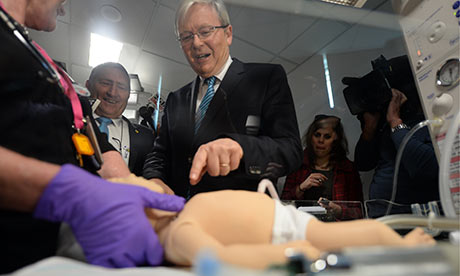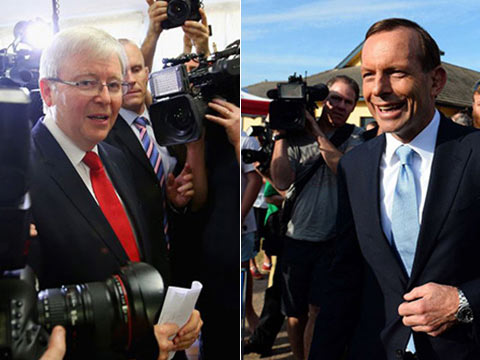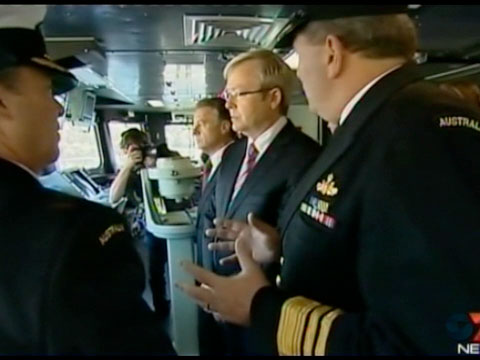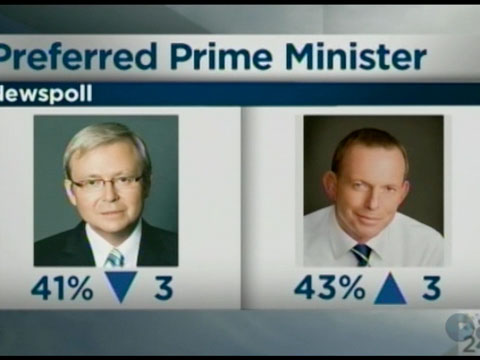Kevin Rudd has accused Tony Abbott of "walking away" from Australia's international commitments on climate change after the Coalition leader said he would not increase funding for his Direct Action plan even if failed to deliver Australia's promised greenhouse gas reductions.
Several attempts to model Direct Action have said it would require many billions more to meet Australia's minimum target to reduce emissions by 5% by 2020 compared with 2000 levels – which has been accepted by all parties.
The opposition leader said he believed Direct Action, which proposes competitive tenders or "reverse auctions" to pay direct subsidies for emission reduction, would meet the goal, but that the Coalition did not intend to do its own modelling before its implementation.
But the prime minister claimed Abbott had "walked away completely from the international targets which [he] thought both sides of politics shared … basically he said ... if his so-called Direct Action plan doesn't work then so be it, then he would simply break his pledge".
Rudd said on ABC radio: "If every government took that position that he has taken then what is the net consequence … that all governments would walk away from hard action."
The Climate Institute said on Tuesday there was "no publicly available evidence" that the Coalition's policies and funding could achieve the 5% target, and said if the Coalition wasn't prepared to spend more money it would have to reduce emissions further through government regulation. "On available evidence, achieving the smaller target may only be possible with significant greater regulation interventions," said the institute's chief executive, John Connor.
"This would include shutting down existing power plants, imposing low emission requirements on new LNG plants and stringent energy efficiency requirements such as emissions standards for cars and dramatically higher renewable energy standards."
And he said the Coalition should explain how its policy could possibly work before repealing Labor's emissions trading scheme – which Abbott has said would be his first legislative act.
"The Coalition owes it to Australians to demonstrate how their plans can achieve the target and they shouldn't repeal existing carbon laws, which can do the job, before offering a credible alternative. The Coalition needs to reveal before repeal," Connor said.
The Coalition is playing down the possibility of the Senate blocking the emissions trading repeal, or its Direct Action plan, and forcing a double dissolution election, by insisting a defeated Labor party would roll over and agree to vote down its own carbon pricing scheme.
Rudd refused to engage in post-election speculation but the climate change minister, Mark Butler, said Labor would not be abandoning its long-held policy stance.
"This mandate argument that says if you lose an election hypothetically, you junk all of your long-standing policy positions and simply cave in to the government of the day is an utter fallacy … It's never been that way and frankly it never should,'' he said.
But the Greens leader, Christine Milne, said voters who wanted to make sure Australia contributed to international efforts on global warming needed to vote Green. She claimed Abbott was walking away from Australia's commitments and Labor could not be trusted.
"The Greens will work with whoever is in parliament for stronger action on global warming and I think we are going to be needed there to keep the Labor party on track," Milne said. "When push comes to shove, you can't trust Labor on the environment."
Speaking at the National Press Club on Monday, Abbott attacked what he called the "almost unimaginable" long-term costs of Labor's emissions trading scheme and insisted the election was a referendum on the carbon price and victory would deliver him a clear mandate to abolish it.
But he would not commit to any modelling of his own scheme despite two recent studies showing it would either cost billions more than budgeted or fail to meet Australia's internationally pledged target.
"The bottom line is we will spend as much as we have budgeted, no more and and no less. We will get as much environmental improvement, as much emission reduction as we can for the spending we have budgeted," Abbott said.
"We are very confident we can achieve the 5% target … but in the end we have told you the money we will spend – and we won't spend any more."
Indicating that he was already preparing for the post-election parliamentary fight over his promise to repeal Labor's emissions trading scheme and the possibility he will be forced to a double-dissolution election on the issue, Abbott spent much of his press club address attacking the long-term costs of Labor's scheme, as revealed in comprehensive Treasury modelling, and arguing that a defeated Labor party would be forced to agree to its repeal.
Abbott claimed there would be a "struggle inside the ALP … a very deep struggle going on for the soul of the party … a developing civil war" between traditional Labor people who think the role of the Labor party is to get a better economic deal for the working person, and those who believe in "social engineering".
"I am confident that if the Labor party loses the election they will draw the right lessons from this and the right lessons are that the Labor party cannot long endure if it sells out the decent ordinary workers of this country," he said.
"If Labor loses this election the last thing they will want to do is continue this relationship with the Greens that has caused them so much pain and the last thing they will do is persist in support for a carbon tax. Having lost one election through support for a carbon tax, why on God's Earth would you lose a second supporting the same failed policy?"
If Labor sticks to its carbon policy, depending on the outcome of the half-Senate election on Saturday, it could mean the repeal is blocked in the Senate, or that a Coalition government is forced to negotiate with a group of centre and right-of-centre independent senators.
Senator Nick Xenophon, who is likely to be re-elected, has indicated he would want to see substantial modifications to Direct Action before he would agree to the repeal of the existing emissions trading scheme.
Modelling by Sinclair Knight Merz/MMA for the Climate Institute found the Coalition would have to find at least another $4bn for its climate policy or else break its pledge to cut emissions by 5% by 2020 and instead allow them to increase by 9%.
Modelling by Reputex climate analytics, commissioned by the environmental group WWF-Australia, found the Coalition funding would fall short by $5.9bn a year between 2015 and 2020, or between $20bn and $35bn in total.
Abbott also confirmed the Coalition policy was unlikely to impose any penalty on any polluter, unless they somehow managed to change "a clean process into a dirty process", something he said no company in its right mind would do.
Even though his promised repeal would reduce power prices, Abbott said he believed the desire to cut costs would prompt companies to reduce emissions of their own volition, without any carbon price.
Abbott promised Tuesday an extra $16m for the Australian Competition and Consumer Commission to police price reductions that should flow if the carbon tax is repealed.
He said he would require the ACCC to monitor prices and report to the treasurer each quarter on the impact of the carbon tax on consumer and supply-chain pricing, market behaviour and efficient competition.











